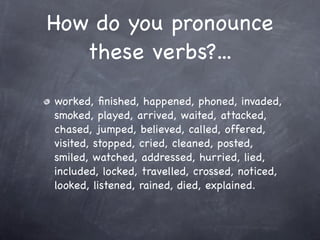Past tenses
- 1. PAST TENSES
- 2. PAST SIMPLE Use the past simple for ïŽnished past actions (last, yesterday, in 1979, two days ago,...) Together with the past continuous use the past simple for a short action that interferes with a long one (suddenly).
- 3. Example 1 John got married in 1980.
- 4. Example 2 While she was having a shower, the phone rang.
- 5. Remember... There are regular verbs: -ED (wanted, played, watched) There are irregular verbs (came, bought, saw...)
- 6. PAST CONTINUOUS (was/were + V-ing) Use the past continuous to describe an action in progress at a speciïŽc time in the past. (at 8 oâclock, yesterday morning...) Together with the past in a story, use the present continuous for descriptions. Use the past continuous for a long action against a short one.
- 7. Example 1 What were you doing at six oâclock last night? I was watching a documentary on TV.
- 8. Example 2 The sun was shining. Three boys were reading a comic and thinking about their next holidays. Suddenly the wind blew and a shadow appeared in front of them. They got scared for a moment...
- 9. Example 3 Ben was cycling in the mountains when it started to rain.
- 10. PAST PERFECT (had + past participle) Use the past perfect when you are talking about the past and you want to talk about an earlier past action. (Remember that it is an action that happened before another action in the past).
- 11. Example 1 When Ben turned on the TV, the match had ïŽnished.
- 12. Example 2 I felt nervous because I hadnât travelled by plane before.
- 13. CAN YOU SEE THE DIFFERENCE? When John arrived, they had dinner. When John arrived, they were having dinner. When John arrived, they had had dinner.
- 14. Letâs check When John arrived, they had dinner. (First John arrived, then they had dinner) When John arrived, they were having dinner. (John arrived in the middle of dinner) When John arrived, they had had dinner, (First they had dinner and then John arrived)
- 15. PRONUNCIATION OF REGULAR VERBS Verbs which end in voiced sounds are pronounced /d/ in the past: /n/ opened, /v/ arrived, /i/ married, /m/ claimed... Verbs which end in voiceless sounds are pronounced /t/ in the past: /k/ packed, /s/ passed, /ts/ watched, /f/ laughed, /p/ tipped Verbs which end in the sounds /t/ and /d/ are pronounced /id/: decided, wanted...
- 16. How do you pronounce these verbs?... worked, ïŽnished, happened, phoned, invaded, smoked, played, arrived, waited, attacked, chased, jumped, believed, called, offered, visited, stopped, cried, cleaned, posted, smiled, watched, addressed, hurried, lied, included, locked, travelled, crossed, noticed, looked, listened, rained, died, explained.















